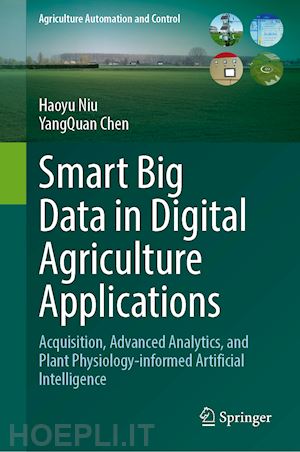
Questo prodotto usufruisce delle SPEDIZIONI GRATIS
selezionando l'opzione Corriere Veloce in fase di ordine.
Pagabile anche con Carta della cultura giovani e del merito, 18App Bonus Cultura e Carta del Docente
Haoyu Niu is a research engineer in the Institute of Data Science at Texas A&M University, College Station (TAMIDS). He works at the intersection of data science and cyberinfrastructure for smart agriculture. He joins a team of researchers from TAMIDS, Texas A&M’s Department of Electrical & Computer Engineering, AgriLife Research, AgriLife Extension, and the School of Performance, Visualization and Fine Arts on a project to develop data-driven infrastructure that enables efficient irrigation using AI-derived crop-growth model based in UAV imaging and environmental data. His research interests include machine learning, computer vision, and robotics. More specifically, he is interested in applying big data, deep learning, and remote sensing technology for data analysis. He received his Ph.D. from Electrical Engineering and Computer Science department at UC, Merced.
YangQuan Chen is a full professor at the School of Engineering, University of California,Merced. He was on the faculty of Electrical and Computer Engineering Dept. of Utah State University, Logan, Utah from 2000 to 2012 where he was a tenured associate professor and the Director for the Center for Self-Organizing and Intelligent Systems (CSOIS) from 2004-2012. Dr. Chen published many books, papers and patents. He served as the General Co-Chair for ICUAS 2014 and 2017, 2019 (International Conference on Unmanned Aircraft Systems), and on the editorial board for journals like IEEE Trans. on Control Systems Technology, ISA Trans., ASME Journal of Dynamics Systems, Measurement and Control, IFAC journals of Control Engineering Practice as well as IFAC Mechatronics, Fractional Calculus and Applied Analysis, and Nonlinear Dynamics. He also serves as the Topical Editor-in-Chief (Field Robotics), International Journal of Advanced Robotics Systems (IJARS) and Intelligent Service Robotics. He serves as an editorial board member of MDPI Applied Sciences, Sensors. His ISI Publon H-index is 67 with more than 19.6k citations, GoogleScholar citation is 43.2k with H-index 91, H10-index 540. Dr. Chen was in the 2018, 2019, 2010 and 2021 Highly Cited Researchers List by Clarivate. He won Research of The Year awards from Utah State University (2012) and UC Merced (2020) respectively. In 2018, for his cumulative work in drones, Dr. Chen won "Senate Distinguished Scholarly Public Service award" that recognizes a faculty member who has energetically and creatively applied his or her professional expertise and scholarship to benefit the local, regional, national or international community.











Il sito utilizza cookie ed altri strumenti di tracciamento che raccolgono informazioni dal dispositivo dell’utente. Oltre ai cookie tecnici ed analitici aggregati, strettamente necessari per il funzionamento di questo sito web, previo consenso dell’utente possono essere installati cookie di profilazione e marketing e cookie dei social media. Cliccando su “Accetto tutti i cookie” saranno attivate tutte le categorie di cookie. Per accettare solo deterninate categorie di cookie, cliccare invece su “Impostazioni cookie”. Chiudendo il banner o continuando a navigare saranno installati solo cookie tecnici. Per maggiori dettagli, consultare la Cookie Policy.